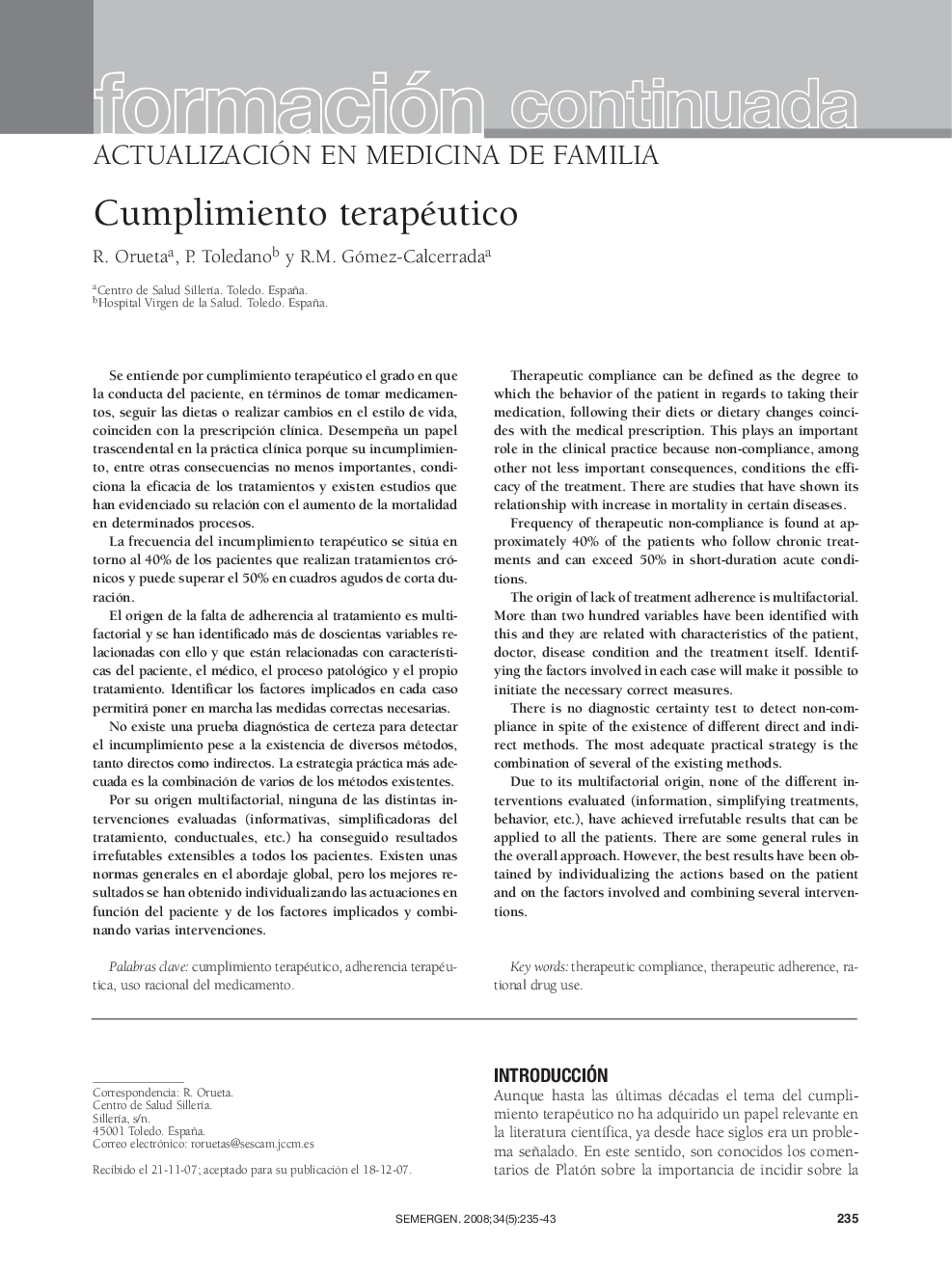| کد مقاله | کد نشریه | سال انتشار | مقاله انگلیسی | نسخه تمام متن |
|---|---|---|---|---|
| 3835541 | 1247383 | 2008 | 9 صفحه PDF | دانلود رایگان |

Se entiende por cumplimiento terapéutico el grado en que la conducta del paciente, en términos de tomar medicamentos, seguir las dietas o realizar cambios en el estilo de vida, coinciden con la prescripción clÃnica. Desempeña un papel trascendental en la práctica clÃnica porque su incumplimiento, entre otras consecuencias no menos importantes, condiciona la eficacia de los tratamientos y existen estudios que han evidenciado su relación con el aumento de la mortalidad en determinados procesos.La frecuencia del incumplimiento terapéutico se sitúa en torno al 40% de los pacientes que realizan tratamientos crónicos y puede superar el 50% en cuadros agudos de corta duración.El origen de la falta de adherencia al tratamiento es multifactorial y se han identificado más de doscientas variables relacionadas con ello y que están relacionadas con caracterÃsticas del paciente, el médico, el proceso patológico y el propio tratamiento. Identificar los factores implicados en cada caso permitirá poner en marcha las medidas correctas necesarias.No existe una prueba diagnóstica de certeza para detectar el incumplimiento pese a la existencia de diversos métodos, tanto directos como indirectos. La estrategia práctica más adecuada es la combinación de varios de los métodos existentes.Por su origen multifactorial, ninguna de las distintas intervenciones evaluadas (informativas, simplificadoras del tratamiento, conductuales, etc.) ha conseguido resultados irrefutables extensibles a todos los pacientes. Existen unas normas generales en el abordaje global, pero los mejores resultados se han obtenido individualizando las actuaciones en función del paciente y de los factores implicados y combinando varias intervenciones.
Therapeutic compliance can be defined as the degree to which the behavior of the patient in regards to taking their medication, following their diets or dietary changes coincides with the medical prescription. This plays an important role in the clinical practice because non-compliance, among other not less important consequences, conditions the efficacy of the treatment. There are studies that have shown its relationship with increase in mortality in certain diseases.Frequency of therapeutic non-compliance is found at approximately 40% of the patients who follow chronic treatments and can exceed 50% in short-duration acute conditions.The origin of lack of treatment adherence is multifactorial. More than two hundred variables have been identified with this and they are related with characteristics of the patient, doctor, disease condition and the treatment itself. Identifying the factors involved in each case will make it possible to initiate the necessary correct measures.There is no diagnostic certainty test to detect non-compliance in spite of the existence of different direct and indirect methods. The most adequate practical strategy is the combination of several of the existing methods.Due to its multifactorial origin, none of the different interventions evaluated (information, simplifying treatments, behavior, etc.), have achieved irrefutable results that can be applied to all the patients. There are some general rules in the overall approach. However, the best results have been obtained by individualizing the actions based on the patient and on the factors involved and combining several interventions.
Journal: SEMERGEN - Medicina de Familia - Volume 34, Issue 5, May 2008, Pages 235-243